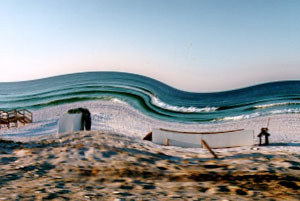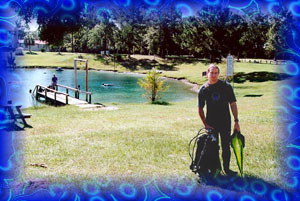And I thought the fun would begin when I got in the water.
I was wrong. I was very wrong. Not only was it not safe in the water, but on land,
especially in your typical dive shop, sharks were everywhere! Yes, you, the unknowing
land-lubber wanders into the "Dive Emporium" like a pogie searching for the rest of
the school, only to be ambushed by "Bob", the Shark owner who's sole purpose in life
seems to sell you the most expensive array of items he carries - "Because this is
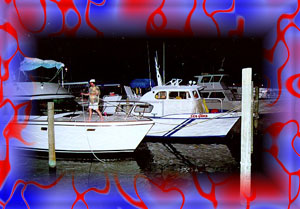 |
| The Sea Cobra Dive boat - most excellent crew! |
your life support equipment..", he says, "You don't want to scrimp on this - trust me;
I know. I've done over x thousand dives! How many dives have you done? None? Well,
I think that speaks for itself don't you?" Bob is the expert; you are the dork. Bob is
a member of that elite clicke - the really cool thrill-seekers; the beautiful people
who finance trips to remote islands by praying on dorks like me who just want to
see fish and coral - and don't necessarily want to be equipped to cave dive the Yucatan
on Helium down to 300 feet for several hours only to see an even deeper hole of water
that has only been viewed by seven other super cool thrill-seekers - well, make that 5
cause one is dead and the other is so bent that he doesn't qualify to be on the
Special Olympics land snorkling team. Alright! Sign me up Bob! Let's party!
This is yet another one of those cases where "Ignorance is bliss." It really is. If
I was just another idiot, I would have walked in, bought the line and things would have
been much simpler, but oh no, not for me... I have to make an informed decision, so
I have to suffer...
An Investment in equipment
One of the worst things in my case of the shops I visited - they all required you to
purchase a bunch of equipment up front - in preparation for the class, before you
knew anything about diving; before you had any clue as to what kind of mask or fins
you felt comfortable with -- yes you have to buy all these things - and they're
generally non-refundable and non-replaceable. No test drive; no Try before
you buy. If you don't like what you bought, tough shit - you're stuck with it. But
then again, Bob, who's dived more last week than you'll probably do all year - he'll
steer you clear - just whip out that MasterCard and Bob will make all that confusion
go away. Yes Virginia, you can easily pay $200 for some molded rubber duck feet, and
$650 for a BC, and $700 for a regulator - and this is what you really need!
In my case, what I found most frustrating was that you really couldn't test the
equipment prior to making a decision. Every shop I visited left you to make a
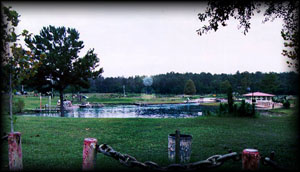 |
| Vortex Springs Aquafer, Florida |
blind choice as to what type of equipment (regulators, BCs, etc) you could use - yes
you got to try the rental equipment, but this was usually only 1 or two brands and
only certain models. Not what I would call a wide selection.
Every SCUBA shop is an island, and when you land on that island, they tell you that
all the other islands suck - that theirs is the best. They tell you that the equipment
they carry is the only decent stuff - all three manufacturers. Yes, what a wide array to
choose from, and of course, each dive shop says they could carry any line of products
they wanted, and these three are their choice - yea right. What a total nightmare this
turned out to be.
Another thing that I learned after the fact is that most of the dive shops specialize
in certain aspects of diving. If you're into basic recreational, shallow, non-technical
diving, beware that if you walk into a shop where the owners dive oil rigs, you'll end
up with a SCUBA setup for that type of diving - even if you tell them you just want something
basic - and I thought car salesman were bad. In my case, I walked into a cave diving
shop - and I had to hear about how cave diving "takes one of the most popular and safest
sports and turns it into one of the most dangerous activities on earth." Wow. Now I'm
really excited.
The Certification Classes
Finally, I had all my equipment. I did my best to get a good deal without spending
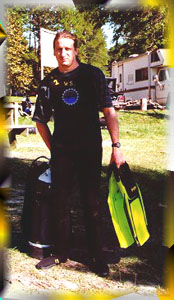 |
| Does this guy ever smile? |
a fortune since I had very little experience. I was pleased with what I managed to
acquire (hopefully without pissing off the dive proprietors too much).
I had my book and study
materials, which to be honest - just weren't half as entertaining as the thought of
actually being in the water, so I probably wasn't overly enthused about sitting
on my sofa reading about scuba diving; something about that just didn't
seem appropriate. Nonetheless I read and became facinated by the phisiology
of the sport.
The thing about SCUBA is that you get enthralled over the idea of cruising along
some gorgeous Caribbean reef cavorting with the fishes so you sign up for the course
and in my case, the first hour of the class had much do to with getting us excited
about the possibilities, but it wasn't long before we were confronted with the reality
of the situation - that we were entering a foreign, potentially hazardous environment,
and there were many precautions to observe. What I found particularly interesting
was the discussion on nitrogen being absorbed by the body at depth - the longer and
deeper you are in the water, the more nitrogen is absorbed. This can be a serious
problem if the nitrogen level becomes too high. If you attempt to ascend too quickly
the nitrogen in your bloodstream can bubble off (not unlike how a soda fizzes when you
release the cap and the pressure decreases rapidly) and create bubbles in your
body which can cause some nasty problems, not the least of which is death. A good
bit of the course involves training to become aware of the level of nitrogen in your
system and how to avoid nitrogen toxicity, narcosis and decompression sickness, as
well as dealing with presure changes and the effects of these things on your body.
Interestingly enough, the cardinal rule of scuba diving is
Never Hold Your Breath! The reason for this is, when you are deep
under the water, the air you're breathing is compressed - if you attempt to ascend,
the air in your body will expand as pressure decreases. If you hold your breath in
this type of situation, it can cause a lung expansion injury which can be potentially
fatal.
Ok, this may not sound all that fun. But it's important to understand the dangers
involved in entering a new, alien environment. The concept of
stress management is an important theme. One is trained to be able to
deal with problems in a systematic manner without panicking.
More of the story!
